|
|
|
Sort Order |
|
|
|
Items / Page
|
|
|
|
|
|
|
| Srl | Item |
| 1 |
ID:
091830
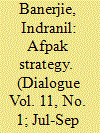

|
|
|
|
|
| Publication |
2009.
|
| Summary/Abstract |
US President Barack Obama is well on his way into implementing his Afpak strategy, which was unveiled shortly after he took office.The idea is to look at the war in Afghanistan in a composite manner, taking into account, among other things, Pakistan's intimate involvement.
|
|
|
|
|
|
|
|
|
|
|
|
|
|
|
|
| 2 |
ID:
133864
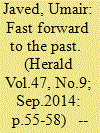

|
|
|
|
|
| Publication |
2014.
|
| Summary/Abstract |
The politics of the nineties is back upon and so is military power
|
|
|
|
|
|
|
|
|
|
|
|
|
|
|
|
| 3 |
ID:
126216
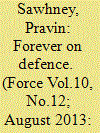

|
|
|
|
|
| Publication |
2013.
|
| Summary/Abstract |
It was a masterstroke by the Pakistan Army 10 years ago. The cue, probably, came from the blockbuster Bollywood movie, Baazigar (gambler), where the hero believed that to gain something big, you have to lose something. By offering the ceasefire on the Line of Control (LC) on 24 November 2003, the Pakistan Army gained a windfall in return for peanuts: it sacrificed covering fire to infiltration across the LC. In return, it got a tamed Indian Army which fenced itself on the LC sending the unambiguous signal that its offensive thinking of the Nineties had been put aside. Docility became the mind-set of the Indian Army and all that is wrong with this wonderful organisation today followed.
|
|
|
|
|
|
|
|
|
|
|
|
|
|
|
|
| 4 |
ID:
105295
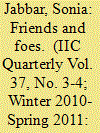

|
|
|
| 5 |
ID:
130649
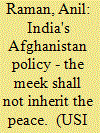

|
|
|
| 6 |
ID:
165946
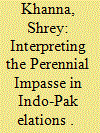

|
|
|
|
|
| Summary/Abstract |
Since the September 2016 attack in Uri, Indo-Pak relations have steadily gotten worse. India cites Pakistan-sponsored terrorism in Kashmir as the major reason for this deterioration, with the 14 February 2019 bombing at Pulwama as the most recent dramatic example; Pakistan blames Indian atrocities in Kashmir. But after every attempt to initiate dialogue, there is a return to hostility. This paper analyzes this cyclical pattern of dialogue, estrangement, and hostility in Indo-Pak relations. Further, it seeks to explain the structural, ideational, and strategic aspects of the problem and to outline a course correction in Indian foreign policy.
|
|
|
|
|
|
|
|
|
|
|
|
|
|
|
|
| 7 |
ID:
125929
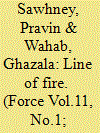

|
|
|
|
|
| Publication |
2013.
|
| Summary/Abstract |
Did India respond appropriately to Pakistan Army's recent ceasefire violations on Line of Control (LC) or should it have done something more or different, is the question at the heart of both bilateral relations between India and Pakistan and India's possible foothold in Afghanistan after 2014.
|
|
|
|
|
|
|
|
|
|
|
|
|
|
|
|
| 8 |
ID:
133863
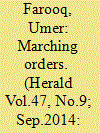

|
|
|
|
|
| Publication |
2014.
|
| Summary/Abstract |
The statement that came out of the corps commanders conference on Sunday, August 31 was a short one."…the conference reviewed with serious concern, the existing political crisis and the violent turn it has taken, resulting in large scale injuries and less of life," it read. "further use of force will only aggravate that problem," it added , "… the situation should be resolved politically without wasting any time and without wasting any time and without resorting to violent means.
|
|
|
|
|
|
|
|
|
|
|
|
|
|
|
|
| 9 |
ID:
109044
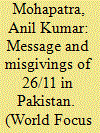

|
|
|
| 10 |
ID:
126177
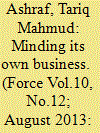

|
|
|
|
|
| Publication |
2013.
|
| Summary/Abstract |
Most countries deploy selected serving military officers as attachés/advisers in their embassies abroad. Though not categorised formally as spies, these military officers do act as the eyes and ears of the intelligence organisation of their native countries. The number of military officers deployed at the embassies in different countries depends on, and varies with, the degree of military interest that one country has in another.
|
|
|
|
|
|
|
|
|
|
|
|
|
|
|
|
| 11 |
ID:
104412
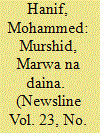

|
|
|
| 12 |
ID:
125927
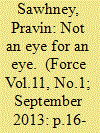

|
|
|
|
|
| Publication |
2013.
|
| Summary/Abstract |
Even as the world is debating implications of Pakistan's signalling that it has developed theatre or tactical nuclear weapons (TNWs), India's response, so far, has been implausible at best, and nonchalant at worst. At the political or strategic level, the Chairman, National Security Advisory Board, Shyam Saran has sought to make a case that India's nuclear weapons are not symbolic but are meant for deterrence. At the military or operational level, the Indian Army, most affected by this new weapon has adopted a dismissive and cavalier attitude. 'We are not sure if this is a bluff, and even if it is not, we do not envisage changing our offensive plans,' is the overriding sentiment at the Army Headquarters. Both stakeholders need to think carefully about a befitting and proportionate response to Pakistan Army's game-changer.
|
|
|
|
|
|
|
|
|
|
|
|
|
|
|
|
| 13 |
ID:
094055
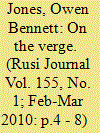

|
|
|
|
|
| Publication |
2010.
|
| Summary/Abstract |
In the border area between Pakistan and Afghanistan, a battle is being waged that could influence the future of the entire region. The Taliban is firmly entrenched, threatening security in the tribal areas and meting out Sharia-influenced justice. Pakistan's state writ is weak, and the Pakistani army is struggling to consolidate its zones of influence. Currently in the eye of the storm, the war in Pakistan is far from over.
|
|
|
|
|
|
|
|
|
|
|
|
|
|
|
|
| 14 |
ID:
187463
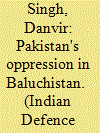

|
|
|
| 15 |
ID:
124680
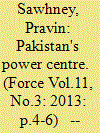

|
|
|
|
|
| Publication |
2013.
|
| Summary/Abstract |
In his years as COAS, General Ashfaq Pravez Kayani has by default done some good to the bilateral relationship.
|
|
|
|
|
|
|
|
|
|
|
|
|
|
|
|
| 16 |
ID:
105298


|
|
|
| 17 |
ID:
110278
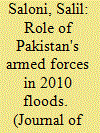

|
|
|
|
|
| Publication |
2012.
|
| Summary/Abstract |
When nature laid its wrath on Pakistan in July 2010, engulfing major parts of the country with devastating floods, it demanded that the nation stand tall. This led to emergence of the Pakistani army as the dominant national player in rescue missions. The army's role gave clear evidence of careful planning, optimal utilisation of resources, sharp foresight, and bold leadership. The army conducted and participated in numerous life-saving operations, and reinvented itself during one of the toughest times faced by this war-struck country. It involved itself in every aspect of the job, and rendered full support in terms of resources and rescue efforts. It helped in controlling the damage to a large extent thereby saving not only lives, but also the means of livelihood. In some ways, these events led to a shift in the previously held negative international opinion of the Pakistani armed forces.
This achievement of the Pakistani army is narrated as a case study that describes and compares the role of armed forces in disaster management and nation-building activities, across the globe. The importance of cooperation between civil administration and military is also discussed, especially with regard to such events where all the national organisations of a country need to work together to bring back peace and stability in the internal environment. Natural calamities can strike any continent or country at any point of time. The events of July 2010 in Pakistan only reinforce the importance and need for us to get our act together and use this experience to create an efficient framework to ensure effective disaster management.
|
|
|
|
|
|
|
|
|
|
|
|
|
|
|
|
| 18 |
ID:
146847
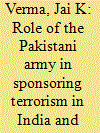

|
|
|
| 19 |
ID:
100383


|
|
|
| 20 |
ID:
130266
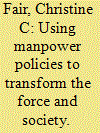

|
|
|
|
|
| Publication |
2014.
|
| Summary/Abstract |
Military manpower policies have an impact beyond the garrison. Policymakers have long held that military service can darn social fabrics that have been rent by ethnic, communal, class, and other cleavages, while scholars debate whether and how this occurs. Because military participation has implications for citizenship, marginalized groups have campaigned to be allowed to participate in the military, and leveraged their service to achieve greater enfranchisement. Military service affects the society as a whole in other ways as well: for example, leaders with military experience are less likely than others to prefer military force when other options are available. This paper examines the Pakistan Army, which, with its domination of the state, feared Islamist tendencies, and incessant belligerence toward India, seems to differ markedly from other militaries. But, using army recruitment and household survey data, it shows that even the Pakistan Army has used personnel policies to reshape its force, despite the numerous challenges of such a course. Whereas recent manpower studies dilate upon how socially marginalized groups employ military service to achieve greater access to citizenship, my analysis exposits how an army uses service in its ranks to cajole reluctant citizens into the national project of Pakistan and encumber them with the responsibilities and rights thereof. While this essay provides greater insights into the Pakistan Army specifically by focusing upon this ostensible anomaly, I hope to inform the larger literature on defense politics and the instrumentality of manpower policies.
|
|
|
|
|
|
|
|
|
|
|
|
|
|
|
|
|
|
|
|
|